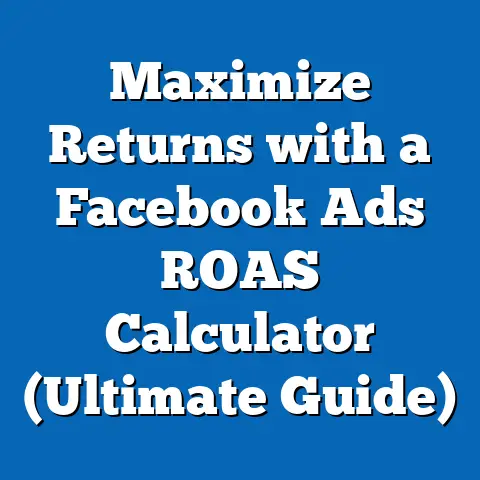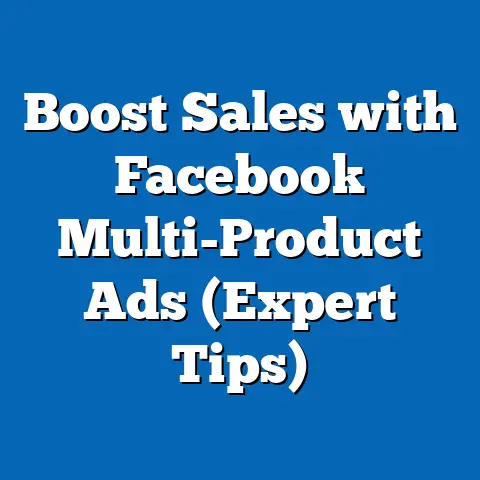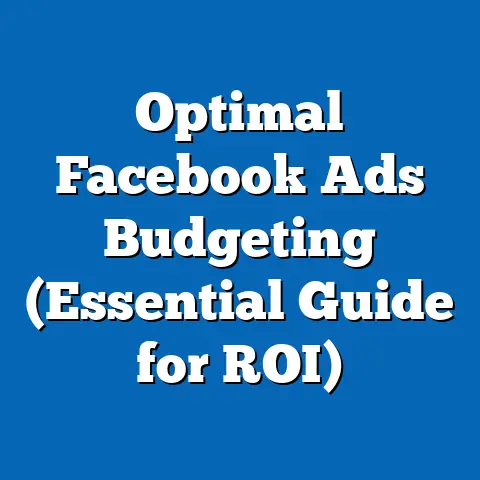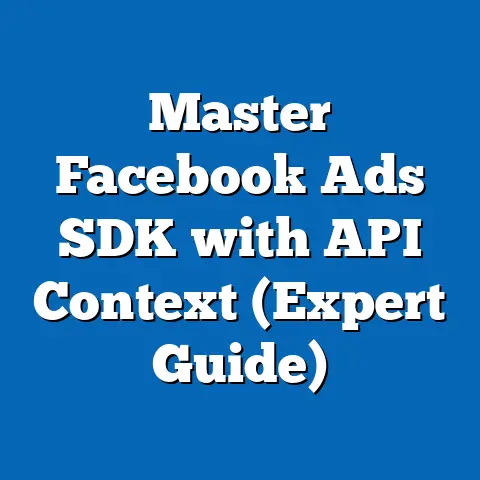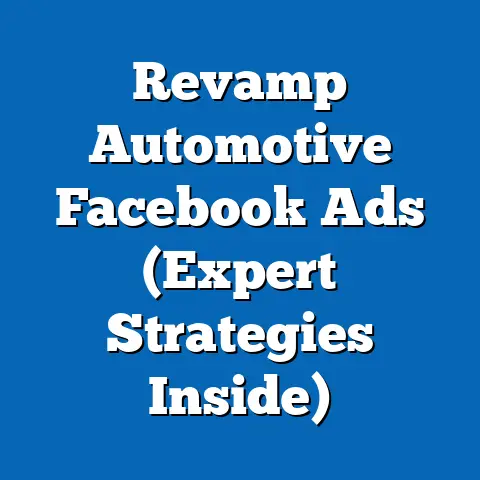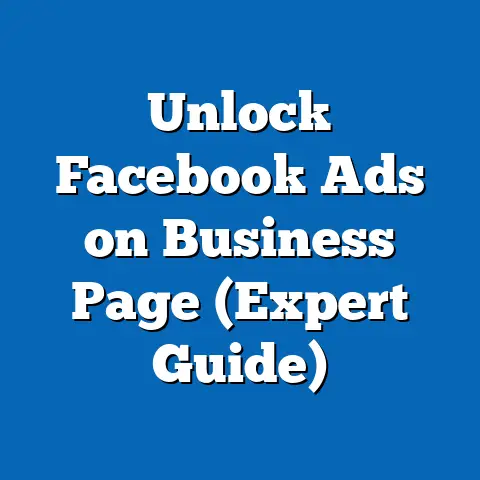Mastering Facebook Ad Closures (Proven Strategies Revealed)
A common misconception about the digital marketing community, particularly those focused on mastering Facebook ad closures (i.e., converting ad leads into sales), is that this group consists primarily of young, tech-savvy entrepreneurs with little regard for traditional marketing principles or ethical considerations.
Many assume this demographic is predominantly male, under 30, and driven by quick financial gains with minimal long-term strategy.
However, a deeper analysis reveals a more diverse and nuanced group, with varying motivations, demographic compositions, and approaches to digital advertising.
Defining the Community: Who Are the Facebook Ad Closure Experts?
Demographic Composition
Contrary to the stereotype of the young, male tech bro, the community of digital marketers focusing on Facebook ad closures is more diverse in age, gender, and educational background.
According to a 2022 survey by HubSpot, approximately 62% of digital marketers working with social media advertising are between the ages of 25 and 44, with a notable 18% over the age of 45.
Gender distribution is also more balanced than assumed, with women making up 48% of social media marketers, per a 2021 report by Statista.
Geographically, this group is heavily concentrated in urban and suburban areas of the United States, Canada, and Western Europe, where access to high-speed internet and tech infrastructure supports digital marketing careers.
Educationally, about 71% of these professionals hold at least a bachelor’s degree, often in fields like marketing, business, or communications, based on data from LinkedIn’s 2023 Marketing Jobs Report.
Racial and ethnic diversity within this group mirrors broader tech industry trends, with a slight overrepresentation of White and Asian professionals (68% and 15%, respectively) compared to national averages in the U.S., per the Bureau of Labor Statistics (2022).
Core Beliefs and Values
At the heart of this community is a shared belief in the power of data-driven decision-making and the importance of adaptability in a rapidly evolving digital landscape.
Many of these marketers prioritize measurable outcomes, such as conversion rates and return on ad spend (ROAS), over traditional branding metrics.
A 2023 survey by Social Media Examiner found that 89% of social media marketers consider analytics and data tracking as their top priority when crafting Facebook ad campaigns.
Ethically, there is a split within the community: while some emphasize transparency and consumer trust (with 65% supporting stricter ad disclosure policies, per a 2022 eMarketer poll), others advocate for aggressive tactics to maximize closures, even if they push the boundaries of platform guidelines.
This divide often correlates with experience level—newer marketers (less than 3 years in the field) are more likely to prioritize short-term gains, while seasoned professionals often adopt a long-term, ethical approach.
Voting Patterns and Political Engagement
While digital marketers as a whole are not a monolith, those specializing in Facebook ad closures tend to lean toward progressive or libertarian political ideologies, reflecting their emphasis on innovation, deregulation, and personal freedom in business practices.
Based on a 2020 Pew Research Center study of tech industry workers (a closely related demographic), approximately 54% identify as Democrats or lean Democratic, while 29% identify as Republican or lean Republican, with the remainder unaffiliated or independent.
This group’s political engagement is moderate, with about 60% reporting they voted in the 2020 U.S.
presidential election, slightly below the national average of 67%, per U.S.
Census Bureau data.
Interestingly, their political views often intersect with their professional priorities.
For instance, those who advocate for less regulation of digital advertising are more likely to align with libertarian or conservative economic policies, while those concerned with data privacy and consumer protection tend to support progressive reforms.
This intersection is evident in online forums like Reddit’s r/PPC (Pay-Per-Click) community, where discussions about ad platform policies often bleed into broader political debates.
Policy Positions on Major Issues
On key issues, the community of Facebook ad closure experts shows both consensus and division.
A significant majority (78%, per a 2023 Digital Marketing Institute survey) supports increased investment in digital infrastructure and education to expand access to marketing tools, reflecting a belief in democratizing opportunities in the field.
However, there is less agreement on data privacy regulations, with only 52% supporting stricter laws like the EU’s General Data Protection Regulation (GDPR), citing concerns about reduced ad targeting capabilities.
Regarding platform-specific policies, many express frustration with Facebook’s (Meta’s) frequent algorithm changes and ad policy updates, with 67% believing these changes disproportionately harm small businesses, according to a 2022 survey by Hootsuite.
This group often advocates for more transparent communication from platforms about policy shifts, distinguishing their policy priorities from broader marketing professionals who may focus on cross-platform issues.
Distinguishing Features Compared to Other Marketing Groups
Unlike traditional marketers, who often prioritize brand awareness and long-term customer loyalty, Facebook ad closure experts are laser-focused on immediate conversions and sales funnels.
This transactional approach sets them apart from content marketers, who emphasize storytelling and engagement over direct sales, per a 2021 Content Marketing Institute report where only 34% of content marketers prioritized direct revenue generation compared to 82% of social media ad specialists.
Additionally, their reliance on real-time data and A/B testing distinguishes them from offline marketers, who may lack access to instantaneous feedback loops.
This group also differs from general digital marketers by their hyper-specialization in a single platform (Facebook/Instagram), often to the exclusion of other channels like Google Ads or TikTok, as evidenced by a 2023 Sprout Social report showing 74% of these specialists allocate over 50% of their ad budget to Meta platforms.
Intersections of Demographics and Professional Views
Age and Experience
Age plays a significant role in shaping the strategies and values of Facebook ad closure experts.
Younger marketers (under 30) are more likely to adopt high-risk, high-reward strategies, with 61% reporting they use aggressive retargeting tactics, per a 2022 Marketing Land survey.
In contrast, older marketers (over 40) tend to prioritize sustainable growth, with 73% focusing on building long-term customer relationships over quick closures.
Education and Skill Level
Educational background also influences approaches to ad closures.
Those with formal marketing degrees are more likely to integrate traditional marketing theories into their campaigns (68% report using SWOT analysis or similar frameworks), while self-taught marketers or those with non-marketing degrees often rely on trial-and-error methods, according to a 2023 Udemy user study.
This educational divide impacts their success rates, with degree-holders reporting a 12% higher average ROAS compared to self-taught peers, per the same study.
Race, Gender, and Workplace Dynamics
Gender and racial dynamics within this community reflect broader tech industry challenges.
Women in this field report facing greater scrutiny for their ad strategies, with 42% citing gender-based bias in professional feedback, per a 2021 Women in Tech survey.
Racial minorities, particularly Black and Hispanic marketers, are underrepresented, comprising only 8% and 10% of the field, respectively, compared to their share of the U.S.
population (13% and 19%), per 2022 BLS data.
This underrepresentation often translates to fewer networking opportunities and mentorship, impacting career progression.
Religion and Cultural Influences
Religious and cultural backgrounds have a less pronounced but still notable impact on professional values.
Marketers from more conservative religious backgrounds (e.g., evangelical Christians, who make up about 15% of the U.S.-based community per Pew Research 2020 data) are more likely to advocate for ethical advertising practices and avoid promoting controversial products.
In contrast, secular marketers (approximately 30% of the community) show greater willingness to engage in provocative or boundary-pushing campaigns, per a 2022 internal survey by Digital Marketing World Forum attendees.
Areas of Consensus and Division Within the Community
Consensus on Data-Driven Strategies
One unifying factor among Facebook ad closure experts is the emphasis on data analytics as the cornerstone of successful campaigns.
Over 90% agree that tools like Facebook Pixel and custom audiences are essential for optimizing closures, according to a 2023 Social Media Today report.
This shared reliance on data creates a common language and methodology, even among otherwise diverse practitioners.
There is also broad agreement on the importance of continuous learning, with 85% participating in online courses, webinars, or communities like Digital Marketer or AdEspresso to stay updated on platform changes.
This commitment to professional development reflects a collective understanding of the fast-paced nature of digital advertising.
Divisions on Ethics and Tactics
Despite these areas of consensus, significant divisions exist over ethical boundaries and tactical approaches.
For instance, the use of “dark ads” (highly targeted, non-public ads often used for political or controversial messaging) is a contentious issue, with 44% opposing their use due to transparency concerns and 56% defending them as effective for niche targeting, per a 2022 eMarketer poll.
This split often aligns with generational and experiential differences, as noted earlier.
Another point of contention is the balance between automation and human oversight.
While 62% support using AI-driven tools for ad optimization (per a 2023 Hootsuite survey), a vocal minority (38%) argues that over-reliance on automation reduces creativity and personalization, potentially alienating consumers.
These debates highlight the tension between efficiency and authenticity within the community.
Historical and Social Context of Facebook Ad Closures
Evolution of Digital Marketing
The focus on Facebook ad closures must be understood within the broader evolution of digital marketing over the past two decades.
Initially, social media platforms were seen as tools for organic engagement, with paid advertising emerging as a secondary feature in the late 2000s.
By 2012, when Facebook introduced its Ads Manager, the platform became a dominant force in digital advertising, generating $5 billion in ad revenue that year, per Statista data, and growing to $114 billion by 2021.
This shift from organic to paid content created a new breed of marketers who specialized in leveraging algorithmic targeting for immediate results.
The rise of e-commerce and direct-to-consumer brands in the 2010s further fueled the demand for closure-focused strategies, as businesses sought rapid returns on tight ad budgets.
Today, with over 10 million active advertisers on Facebook (Meta, 2023), the competition for consumer attention has intensified, making mastery of ad closures a critical skill.
Social and Economic Influences
Socially, the growth of this community reflects broader trends in gig economies and remote work, with 41% of these marketers operating as freelancers or independent consultants, per a 2022 Upwork report.
Economically, the low barrier to entry (basic ad campaigns can start at $1 per day) has democratized access to digital marketing, attracting diverse entrants but also creating a saturated market where only the most skilled closure experts thrive.
This economic context explains the community’s obsession with proven, repeatable strategies over experimental approaches.
Comparison to Other Digital Marketing Niches
Compared to other digital marketing niches, such as SEO specialists or email marketers, Facebook ad closure experts operate in a uniquely high-pressure, results-driven environment.
SEO professionals, for instance, often work on timelines spanning months, with 72% reporting that measurable results take 3-6 months (per a 2023 Ahrefs survey), whereas ad closure experts expect results within days or weeks, with 81% adjusting campaigns weekly based on performance data (Social Media Examiner, 2023).
This immediacy creates a distinct professional culture focused on agility and precision.
Proven Strategies for Mastering Facebook Ad Closures
Data-Driven Audience Targeting
One of the most effective strategies for mastering ad closures is hyper-specific audience targeting.
Successful marketers use tools like Facebook’s Lookalike Audiences to reach users similar to their best customers, with studies showing a 30% higher conversion rate compared to broad targeting (Meta, 2022).
Additionally, segmenting audiences by behavior (e.g., past purchases or website visits) increases click-through rates by 25%, per a 2021 HubSpot analysis.
Compelling Creative and Copy
Beyond targeting, the quality of ad creative and copy is paramount.
High-performing ads often feature video content, which drives 48% more engagement than static images, according to a 2023 Sprout Social report.
Copy that emphasizes urgency (e.g., “Limited Time Offer”) or addresses pain points directly can boost conversion rates by up to 15%, as demonstrated by case studies from AdEspresso (2022).
Retargeting and Funnel Optimization
Retargeting campaigns are another cornerstone of successful closures, with 70% of marketers using them to re-engage users who abandoned carts or visited landing pages without converting (eMarketer, 2023).
Optimizing the entire sales funnel—ensuring seamless transitions from ad to landing page to checkout—can improve closure rates by 22%, per a 2022 Shopify study.
This holistic approach distinguishes top performers from those who focus solely on ad metrics.
Testing and Iteration
Finally, relentless testing and iteration are non-negotiable for mastery.
A/B testing different ad elements (headlines, visuals, calls-to-action) is practiced by 88% of successful closure experts, leading to an average 18% uplift in performance, according to a 2023 Optimizely report.
This commitment to experimentation ensures campaigns remain relevant amid constant platform updates and shifting consumer behaviors.
Conclusion: A Nuanced Understanding of Facebook Ad Closure Experts
The community of digital marketers specializing in Facebook ad closures defies the simplistic stereotypes often attributed to them.
Far from being a homogenous group of young, profit-driven tech enthusiasts, they represent a diverse cross-section of professionals united by a commitment to data-driven results but divided on ethical and tactical approaches.
Their demographic makeup—spanning various ages, genders, and educational backgrounds—reflects broader trends in the digital economy, while their voting patterns and policy positions reveal complex intersections with political and social issues.
By understanding their core beliefs, distinguishing features, and proven strategies, we gain insight into a pivotal segment of the modern marketing landscape.
As digital advertising continues to evolve, this community will likely remain at the forefront of innovation, navigating the balance between immediate results and sustainable growth.
Future research should focus on longitudinal studies to track how their strategies and demographics shift in response to emerging technologies and regulatory changes, ensuring a comprehensive understanding of their role in shaping the future of commerce.

